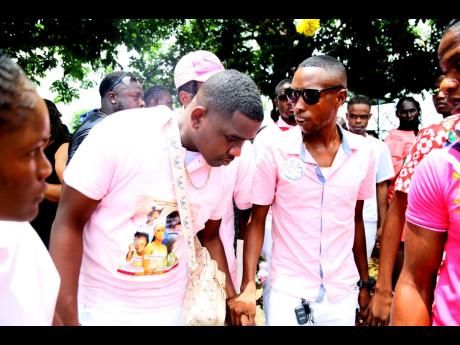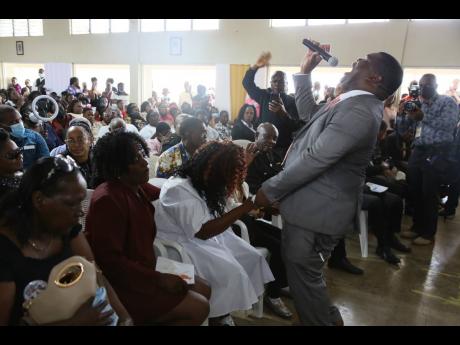PAIN AND AGONY
Funeral of Cocoa Piece five stirs emotion; PM cites child beatings as factor of crime
The thousands of mourners who swarmed Chapelton on Sunday to bid a sombre farewell to the butchered Cocoa Piece family of five offered an outsize national rebuke to Jamaica’s crisis of domestic crime.
But for six-year-old Beulah All-Age student Maliah Rowe, the loss of of her five-year-old friend Rafaella Smith was deeply personal, simple, yet profound.
“She was nice to me. Mi glad fi come, but me sad. I miss her. We used to play at lunchtime,” Maliah recalled, though the two were in separate classes.
Her grief mirrored the pain and anguish that rocked the Stuart Hall Auditorium at Clarendon College as a nation bedevilled by violent crimes mourned the loss of young Rafaella and her family, mercilessly slaughtered by an adult cousin.
The cloud of anger and agony enveloping the funeral site, a mile and a half from the Cocoa Piece home of Rafaella, her 23-month-old brother Keshawn Henry, sisters Kimanda Smith, 15; Shara-Lee Smith, 11; and mother, 31-year-old Kemesha Wright, could not be belied by bouts of cheers and laughter.
The mutilated bodies of the five and the man responsible never left the thoughts of mourners, who consistently decried the “wicked act” that shocked the country on June 21.
Tearful tributes triggered waves of emotions among the thousands gathered, but it was the two by Gwendolyn McKnight, the matriarch of the slain family, and songbird Jodian Pantry, that evoked wails of grief.
The latter’s rendition of Whitney Houston’s I Will Always Love You broke family members, who before then, had brave faces.
“It too much. It too much,” McKnight, wrapped in the bosom of a family member, cried.
The mayhem caused by 23-year-old Rushane Barnett, who pleaded guilty to killing his cousins last Thursday, was more than she could bear.
“This yah boy yah nuh have nuh heart inna him. Him fi dead instant. Him nuffi deh a jail,” McKnight’s sister, Michelle Dennis, bemoaned during a Gleaner interview. “Look pon the baby. You have the heart fi kill the babies? Look pon the three little babies.”
Barnett was said to have acted as protector and babysitter for the children when Wright, a devoted mother, had school to attend.
Officiating pastor Dr Donald Johnson stressed that the chaos, hatred, and murders were evidence of the devil being set loose on the country.
“The Bible says he comes to steal, to kill, and to destroy. As a result, he unleashes demonic forces which are sweeping communities, and many lives are being destroyed today,” Johnson charged in his sermon.
Prime Minister Andrew Holness called the incident tragic, declaring that his heart “wept” upon learning of the mass murder after arriving in Kigali, Rwanda, for the Commonwealth Heads of Government Meeting.
Holness noted that the African country, some three decades ago, was riven by genocidal violence against the Tutsis. He noted that Rwanda was able to effectively resolve its years of violence, becoming a relatively peaceful country, only after acknowledging that it had a problem.
Holness argued that Jamaica has not yet squarely confronted the factors of the country’s cultural problem of violence.
The prime minister said corporal punishment, which has become entrenched in Jamaican culture, remains one of the root causes.
He said that this has repeatedly taught children to respond to difficulties with violence.
“I don’t know, Gwendolyn, what would have possessed that young man that day. I don’t know, but what I do know is that the society in which we live needs serious attention to this issue of the use of violence to resolve conflict,” said Holness.
The prime minister said that an established anti-violence commission led by Professor Maureen Samms-Vaughan is to produce an interim report soon on the measures the Government will have to undertake to address “this epidemic, this disease of violence in the society”.
Holness listed bits of legislation which, he said, are being used, in the meantime, to stem the crisis.
The prime minister said that the State must become far more active than it is now in ensuring that support is given to the victims of crime to prevent revenge.
He said a system of early detection, early intervention, and early warning was also required.
“In this instant case, the perpetrator came to the attention of law enforcement before this. There was no follow-up intervention to determine whether or not this person would commit an act in the future, but that is just how our system is. We have to change that,” he said.


